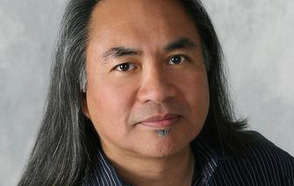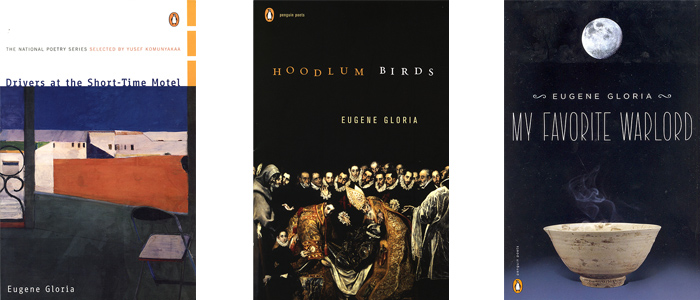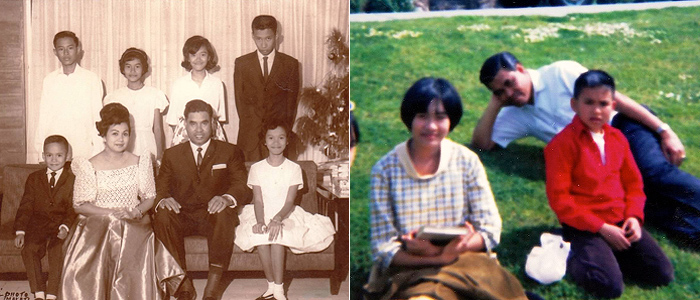Talking with Eugene Gloria

Professor of English Eugene Gloria
August 5, 2013
Professor of English Eugene Gloria picks over his poems for months or even years at a time. “Water,” which opens his 2012 collection, My Favorite Warlord, took nearly three years to finish – a letter-a-day pace, including the title. It reads like a short story trimmed of fat, refined by its creator until each phrase realized its potential:
The street when I was five
was a deep, wide river
coursing through a shimmering city.
I had no need for proper shoes,
no need for long pants.
I didn’t yet know how to make
conclusions and say, “Life’s like this...”
[continued below]
Gloria was born in Manila, Philippines, and moved with his parents and five older siblings to San Francisco in 1967, just as the city was entering high tide of the Sixties. Traces of his Filipino and San Franciscan roots can be found throughout his work, including his first two books, Hoodlum Birds (Penguin, 2006) and Drivers at the Short-Time Motel (Penguin, 2000), which was selected for the 1999 National Poetry Series and also won the Asian American Literary Award. My Favorite Warlord, his third and most recent book, received a 2013 Anisfield-Wolf Book Award, placing Gloria in company with past recipients Zadie Smith, Toni Morrison and Langston Hughes.
Below, Gloria discusses his brush with the law, teaching students how to fail better, and Toyotomi Hideyoshi, his favorite warlord.
DEPAUW: You’ve won major awards for your poetry, so it would probably surprise some people to hear that you almost became a lawyer. Those two paths – law and poetry – usually diverge early on in life. What made you want to become a lawyer, and what changed your mind?
GLORIA: One of the things that turned me on to the idea of being a lawyer was being immersed in a kind of language, and the language of law has always fascinated me. And law was sort of the thing to do if you were a male in the Gloria clan in the Philippines. My father was a lawyer, and my uncles were lawyers, so I thought that would be my career, too. When I was choosing my major as an undergrad, my dad said, “You should major in political science because you’re going to go to law school.” I said, “Okay! I will!” So I just followed the path, double majoring in English and political science.
But I grew disillusioned by the practice of law while working for the bar association in San Francisco after college. I was planning to attend law school, so I wanted some work experience in the legal field. I worked for a lawyer referral service. People would call looking for a lawyer, and we would find somebody appropriate for their legal needs. I did that for about five years, and it was the most stressful job I’ve ever had. I talked only to people who were in trouble and needed help. But it wasn’t the clients who turned me off, even though they stressed me out because they were crazy most of the time – I was in San Francisco after all. I learned the attorneys weren’t who I thought they would be. Let’s put it that way. That was a turning point for me.
I always liked writing. I always wrote secretly and privately when I came home. So I thought, well, I will go to graduate school, get a higher degree and maybe teach. When I went to grad school for English, instead of being a literature person, I met other writers who said, “You know, you should join our tribe and be a writer like us.”

DEPAUW: When did your love of language begin?
GLORIA: I always loved reading. I was the youngest in the family. When I was in elementary school and my siblings were in high school, I would go to my sister’s bookcase and read books she was reading in high school and later in college. I read Nathaniel West, Mark Twain, and all kinds of different writers. I didn’t have parents who encouraged reading in a serious way. Even though my father was a lawyer, I seldom saw him reading something for pleasure other than the news, magazines or Reader’s Digest. So, I was inspired to read by my own curiosity.
Going to church, going to Mass, all that language was thrown at me – all that Latin. That was always very interesting to me. And growing up in San Francisco, I had such a rich landscape of poetry. I was back in the city recently and just discovered the apartment on Montgomery Street where Allen Ginsberg wrote “Howl,” and I thought, wow, I walked by that place so many times.
I think as I mature and deepen my understanding of poetry, I am examining my frustration with language more. I think that poetry is often a failed endeavor because we can’t fully capture the power of our emotion and what we feel with words. I struggle all the time thinking about how I can make my poems feel real to me without also feeling this sense of failure. There’s always this tension of being narrative about it and being clear as opposed to being more lyrical and musical and maybe not being understood. That’s a tension I’m always working with in my poems.
DEPAUW: What spurs you to sit down and write a poem? Where do your ideas come from?
GLORIA: Many times my poems begin as a conversation with something I’ve just read. Right now I’m reading John Banville, who’s an Irish writer. I love his writing for its beautiful language. I might take an image from reading someone like him, then suddenly find myself going to my journal and writing. But many times a poem begins out of nowhere. I make myself write every morning, and maybe I get into an idea or a line or a sentence that takes me somewhere else. I follow it and it becomes something – or not. I really don’t know where I’m going when I start out, so sometimes I just follow that uncertainty to wherever it takes me.
DEPAUW: Your latest book, My Favorite Warlord, is described as a collection of poems about Hideyoshi, the 16th-century Japanese daimyo, and your father. How do these two men fit in the same volume?
GLORIA: The book actually began from a failed project. In my original conception, the book was a kind of memoir of 1967. I wanted to isolate 1967 as an important time in my life. I was about 10 years old, and my family had just moved to San Francisco. I was working on this idea that the author Susan Orlean wrote about, that men at 40 are who they were when they were 10. I wanted to go back to 1967 and trace my sense of identity from there. I started on that project and wrote a few poems, but the more I tried to create something from that idea, the more it fizzled.
One of the things that interested me during this project was the idea of masculinity and the study of maleness. While I was thinking about that idea, I decided to live in Japan during my sabbatical leave because I was always fascinated with the country, and I hoped something would happen to me there. Nothing really significant happened to me, but I learned about Hideyoshi. He became an iconic figure who captured the idea of masculinity for me. He was this stern warlord who at the same time valued the finer things in life. He introduced the art of tea to Japan and the whole idea of bringing that sense of culture to daily life.
As I was writing poems of that period, up until a year before Penguin published the book, I was thinking more and more about my father. He was suffering from dementia and growing frail. He was always a huge figure in my life and a man I admired and wanted to be in many ways. The project became more and more a meditation of my father, and my father as a failed man in some ways. He wasn’t faithful to my mother. And he wasn’t an effusive, doting father in the typical American way, like, “Hey, let’s go watch a ball game!” He was a lawyer and community leader. He was busy. He had his own thing going on. But I don’t think he was neglectful. I think he could have been a stronger figure in our household, but he deferred to my mother too much, perhaps because he was suffering from a lot of guilt from being unfaithful.
So, I decided to combine the two ideas. It became an accidental book in that I was conflating my thoughts about Hideyoshi with meditations on my father. People assume that “my favorite warlord” is my father, which really isn’t the case. But I don’t mind the mistake, because on some level I was thinking about both of them as one thing.

DEPAUW: It must be difficult to teach something that is so personal to you – and so difficult to capture.
GLORIA: It’s challenging. One can take it quite personally, especially if the students don’t love poetry or they write or read it out of sufferance. I love teaching poetry although I do tend not to teach the poets I truly love because if students hated their work I would probably take it personally. I try to understand that students might be exploring something that is foreign to them, so I try to make it less foreign and more relevant to them. And poetry is relevant to them and us in many ways. It’s not just some elite, obscure thing. It’s about your sense of the human condition, and what you think about and see in the world. In my creative writing classes, I usually start out with fiction and end with poetry. Students end up surprising themselves and realizing, “Oh, I can do this.” That opens doors.
DEPAUW: Do you have to push students away from imitating the poetry that is familiar to them?
GLORIA: No! But I encourage them to take risks even if they might fail in a big way. Part of what you learn in a creative writing workshop is to thicken your face and accept people, especially your classmates, criticizing your work. I expect students to be ambitious and not be afraid of failing. I want them, in Samuel Beckett’s words, to “Fail again. Fail better.” In the process, they might discover, for instance, that imitating “Howl” may not be the best model, but at least they have a sense of what they want to write. Even if you like pop songs and want to write a poem in the manner of a pop song, that’s a start, which is not a bad thing. So, I try to work with students on their level of commitment and their sense of natural talent. It takes a while to develop the willingness to fail and not feel bad about it. I know that’s how I learned to write poetry.
Water
The street when I was five
was a deep, wide river
coursing through a shimmering city.
I had no need for proper shoes,
no need for long pants.
I didn’t yet know how to make
conclusions and say, “Life’s like this...”
You could say I was baptized by a red circle
at the center of my forehead – a constellation
of tiny scabs, federated by Mercurochrome.
Why the dots on my forehead?
And why, you might ask,
did I want to cross the glistening street?
I had crossed my brother and in his anger
he chucked the whiskbroom; its edge-tip
handle smacked my forehead.
I was five, my brother was fifteen.
What was he doing washing his body
at the spigot behind the house?
I caught him bathing
not in the shower where he should’ve been,
but alone in the small yard, a tin
can in his hand, dousing his head with water.
Why did I laugh when I saw him?
What did I know about anything?
Was this the beginning
of my brother’s rage? Was this the birth
of water? The cool drink
an old woman wanted and I, instead of
directing her to the kitchen where
a pitcher of water was chilling in the icebox,
led her to the spigot out back.
There is no story here. No melody
to this song; only a street and what
punishment metes to the one who wants
what he knows he cannot have.
And the water?
The whole expanse of it –
was only a street I wanted to cross.